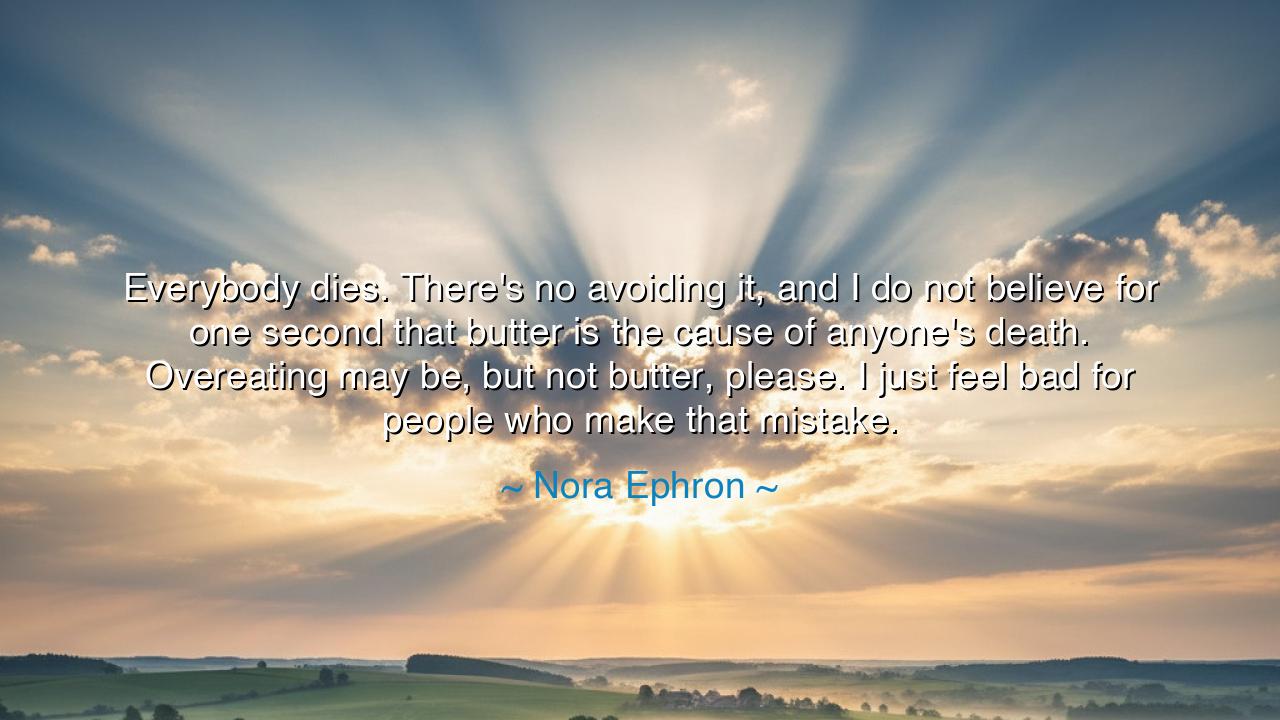
Everybody dies. There's no avoiding it, and I do not believe for
Everybody dies. There's no avoiding it, and I do not believe for one second that butter is the cause of anyone's death. Overeating may be, but not butter, please. I just feel bad for people who make that mistake.






“Everybody dies. There’s no avoiding it, and I do not believe for one second that butter is the cause of anyone’s death. Overeating may be, but not butter, please. I just feel bad for people who make that mistake.” — Nora Ephron
In this witty yet profound reflection, Nora Ephron, that keen observer of life’s sweetness and sorrow, offers us more than a defense of butter — she offers a philosophy. Her humor veils a truth both ancient and eternal: that death is inevitable, but how we live before it comes is our choice. Ephron’s words are not about food alone; they are about freedom, joy, and the courage to live fully in a world obsessed with fear and control.
When she says, “Everybody dies. There’s no avoiding it,” she speaks the truth known to all sages since time began. Death is the great equalizer — unmoved by virtue, wealth, or restraint. The ancients would have nodded in agreement. The Stoics of old taught that to fear death is to waste life; the Epicureans said that death is nothing to us, for when it comes, we are not. Ephron, in her modern tongue, echoes their wisdom: why live in dread of what cannot be escaped? Better to savor life while it lasts — even if that savor comes in the form of butter melting on warm bread.
But her words strike at another illusion — the human belief that by denying ourselves joy, we can cheat mortality. “I do not believe for one second that butter is the cause of anyone’s death,” she writes, and behind the humor lies defiance. In every age, people have sought to control fate through ritual or restriction — the ascetics fasting in the desert, the modern dieters counting calories. Yet Ephron reminds us that such fears often rob us of the very pleasures that make life worth living. To her, moderation is wisdom, but denial is folly.
Consider the story of Julia Child, the great culinary pioneer and Ephron’s own inspiration. Julia, who cooked with butter in nearly every dish, lived into her nineties, vibrant and unrepentant. When critics warned of fat and danger, she laughed, saying, “Everything in moderation, including moderation.” She, like Ephron, knew that to live in constant fear of death is a greater death than the one that ends our days. The butter was never her enemy — only the refusal to taste life was.
There is also tenderness in Ephron’s final remark: “I just feel bad for people who make that mistake.” Here, she shows compassion, not judgment. She pities those who trade the richness of living for the illusion of control, who mistake avoidance for virtue. In her view, those who deny life’s simple joys in the name of safety are like travelers who, fearing storms, never leave the harbor. They may live long, but they do not truly live.
Thus, her humor conceals an ancient truth: that mortality gives flavor to existence. The knowledge that “everybody dies” is not tragedy but liberation. For when one accepts death, one becomes free to enjoy the warmth of sunlight, the laughter of friends, the taste of food, and the fleeting moments that make a life beautiful. To live wisely is not to live forever, but to live deeply.
So, what lesson shall we draw from Nora’s buttered wisdom? Do not fear life’s end — fear the unlived life. Eat with gratitude, not guilt. Work hard, love well, and take joy in the small things. When you savor life’s richness — its butter and its bitterness alike — you honor both the gift and its giver. And when the final morning comes, you may go gently, knowing you did not waste your days in fear, but filled them with the golden warmth of being fully, gloriously alive.






AAdministratorAdministrator
Welcome, honored guests. Please leave a comment, we will respond soon